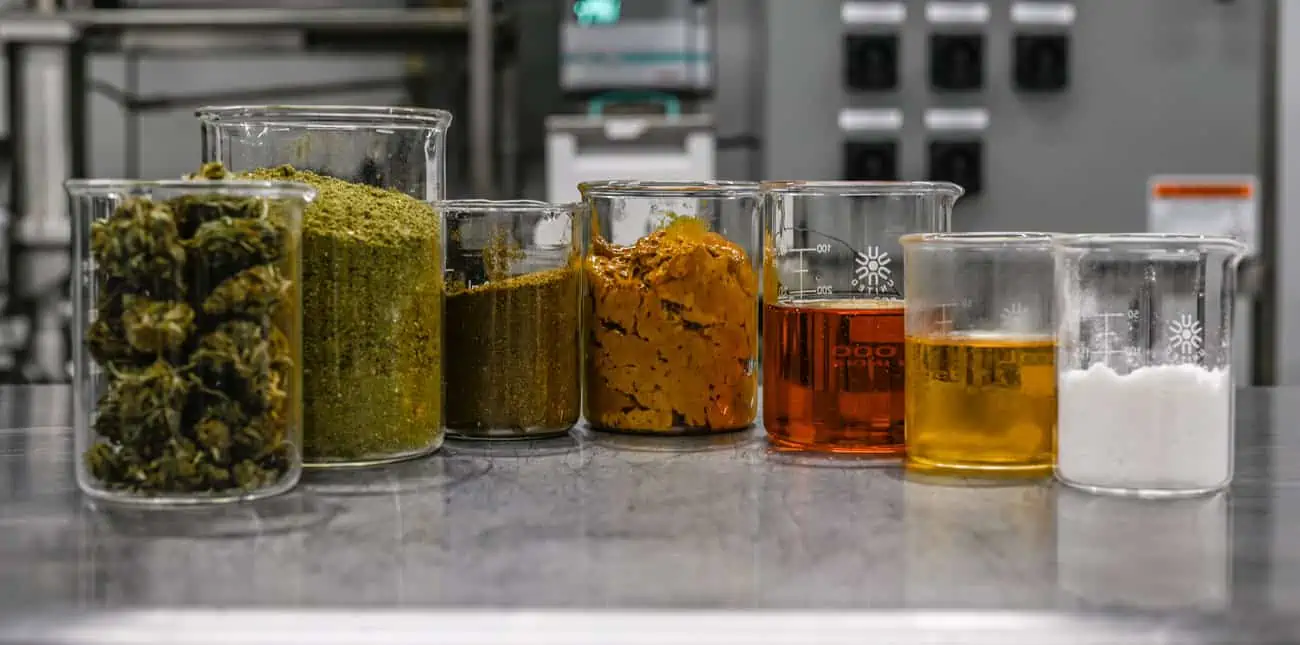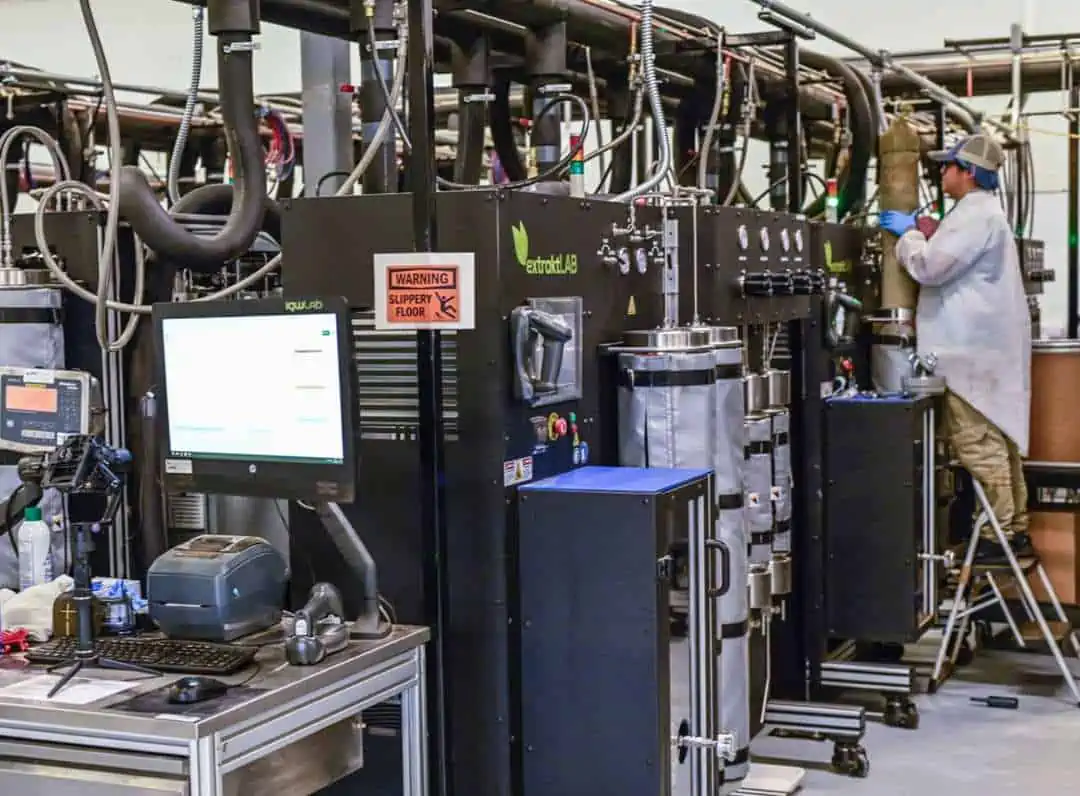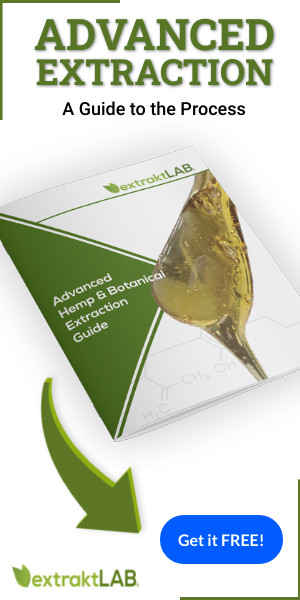THC Extraction Machine
The industry of CBD and THC extraction continues to grow in popularity and profitability. And, as advances in extraction continue, the need for a high quality THC extraction machine is critical for any serious producer. As with any plant oil extractor, the best THC extraction machine uses a high power solvent to strip the plant of cannabinoids, terpenes, and other plant materials. That being said, not all extraction methods are equal with some solvents posing potential risks both for consumers and producers.
The fact of the matter is that THC extraction has become a somewhat complicated, technical process, but it doesn’t have to be a stopgap for extractors. This article will discuss the new and improving science of the latest THC extraction machine, how THC extraction is performed, and how extraktLAB’s supercritical CO2 extractors or the best possible option for serious producers looking to take their business to the next level.
What is THC Extraction
The process of extracting THC is similar to other extraction processes like essential oils. In the case of a typical THC extraction machine, solvents like hydrocarbons, ethanol or CO2 are used to strip cannabinoids, terpenes and other plant components from the biomass. This is the very first step in creating THC extract products like dabs, edibles, tinctures, and others. Depending on the scale and desired outcome of the extraction process, a THC extraction machine could look and perform in varying ways:
At Home THC Extraction Machine: In its smallest scale, THC extraction can be done with very simple at home equipment. For example, Rick Simpson Oil (RSO) is a very simple extract that uses very little equipment at all. A THC extraction machine in this case would simply be a jar to contain ethanol and biomass, a funnel and filter, and something like a rice cooker to slowly decarboxylate and remove remaining solvents. This creates a potent THC extract intended for consumption often in medicinal settings.
Ethanol/Hydrocarbon THC Extraction Machine: Some larger scale extractors are designed specifically for ethanol extraction, a powerful extraction solvent in and of itself. Due to the volatile nature of ethanol, these extractors are often designed to safely operate with the flammability requirements of an ethanol extraction. The same can be said of hydrocarbon extractors which often operate with the same ramifications in place.
CO2 THC extraction machine: Designed specifically for Supercritical, or Subcritical CO2 extraction, this form of THC extraction machine is not applicable to a small-scale home extraction setting, but is a phenomenal option for larger scale applications in industrial THC extraction. Because CO2 is a far cheaper extraction solvent ethanol or hydrocarbons, and is far less dangerous for both producers and consumers, CO2 extraction is often the safest most efficient option for large scale THC Extraction.
Guide to a THC Extraction Machine
extraktLAB’s line of supercritical CO2 extractors are the highest in quality, efficiency and GMP compliance in the hemp extraction industry. With three models capable of extracting from 422 to 844 pounds per day, there is a machine for every extraction business’ needs. Take our visual tour for an inside look inside the extraktLAB extractor series.

How to Use THC Extraction Equipment
When it comes to THC extraction, the general principle remains the same throughout: take desired plant components and concentrate them into formulable extracts. The difference often depends on the THC extraction machine used, and the method by which extraction is accomplished. In simple terms, using THC extraction equipment works like this in the extraktLAB supercritical CO2 extraction setup.
- Grind biomass to desirable texture
- Decarboxylate biomass to activate THC-A to THC and collect valuable terpenes via cold trap. This is an optional step as some extractors decarboxylate during the extraction process; however, terpenes are then subjected to damage through heat and pressure often degrading them by the time they reach product formulation.
- Extraction of biomass using supercritical CO2 extraction. This process uses heated and pressurized CO2 to mix with biomass and pull desired cannabinoids into a crude oil. This oil is in need of further refinement for product formulation.
- Winterize and filter crude oil to remove fats, waxes and other impurities using ethanol and subzero temperatures to remove insoluble compounds from the remaining mixture before being filtered.
- Remove remaining solvents using rotary evaporation or falling film evaporation. After using ethanol to winterize extracted crude oil, the evaporation of remaining ethanol solvents is important to create a safe, quality product for consumers.
- Final distillation is needed to completely remove any remaining solvents, terpenes, chlorophylls and any other undesirable components using wiped film evaporation. This results in a beautiful, clear-gold distillate that is then ready for product formulation.
Each step in this process has its own set of rules and operating procedures that are critical for an efficient extraction setup. Learning these principles takes plenty of time and can be daunting. However, extraktLAB has the answers for these concerns from upfront costs to long-term profitability in a CO2 extraction facility.
THC Extraction Equipment Cost and Support
The cost of a CO2 THC Extraction Machine can be daunting at first, until it is compared to the overall long-term profitability of a CO2 extraction setup. For example, CO2 as an extraction solvent is much less costly than ethanol making long-term upfront solvent use and recycling costs are exponentially less than other extraction methods.
Take a look for yourself using our Estimated CO2 vs Ethanol Extraction Yearly Operating Costs Calculator
In an effort to create a seamless, productive cost efficient extraction setup, extraktLAB offers total solutions for extraction equipment, services, and software.
extraktLAB is your one source for turnkey, GMP-compliant manufacturing solutions for the extraction industry. Whether you’re processing marijuana or hemp into refined oils, our total solution approach takes the risk out of startup while optimizing your manufacturing line for long-term growth and success.
With the most comprehensive manufacturing solution offering in the extraction industry, extraktLAB can configure, design, engineer and commission a turnkey GMP manufacturing solution for you – on time and on budget. The manufacturing process has several steps before and after the actual extraction of oils from biomass. Pre-extraction processes prepare the biomass for efficient extraction. Post-extraction processes further refine the extracted THC and CBD oils for various products and market segments.

Everything to know about an Oil Extractor
Can CO2 be used to extract other botanicals? The answer is yes. A Supercritical CO2 extraction setup is essentially just an oil extractor. For this reason, CO2 has been historically used to extract many different kinds of biomass. The most famous and successful industrial process for CO2 extraction is the coffee decaffeination process.
However there are many other essential oil extracts that are used in the supplements industry that utilize a CO2 oil extractor. One good example of this is found in hops. Hops are used to brew beer and add flavor to beer. An oil extractor is used to extract the essential bitter flavor from the hops so that the flavors can be blended and preserved.
The essential oil industry is also commonplace for an oil extractor like these. While some may use ethanol, others often use CO2. The process is nearly identical to a THC extraction machine with only minor details altered depending on the biomass used to create the essential oil extract. Either way, it is clear that an oil extractor is not alien technology and is commonly used in a number of different industries.
Supercritical CO2 Machine Product Tour
Get access to extraktLAB’s line of supercritical CO2 extractors which considered as the highest in quality, efficiency and GMP compliance in the hemp extraction industry.
Frequently Asked Questions
What is the solvent loss for ethanol extraction?
Hemp and cannabis biomass is an extremely absorbent material. As a consequence, a large amount of solvent volume must be added to the biomass to first solvate the biomass and then fluidize it. For ethanol extraction, approximately one gallon of ethanol is required to extract 1 lb of hemp. Solvent loss comes from the incomplete recovery of that solvent from the hemp.
The following table details the estimated solvent loss from ethanol extraction as a function of volume of hemp processed:
| Lbs processed per day | Daily requirement of
ethanol (gallons) |
Daily Loss of ethanol (gallons) at 90% recovery of ethanol | Max Cost of Solvent Loss per day:
$16-30/gal food grade ethanol $6-8/ gal denatured Calculated at $30/gal |
| 500 | 500-1500 | 50-150 | $1,500-45,000 |
| 1000 | 1000-3000 | 100-300 | $3,000-9,000 |
| 2000 | 2000-6000 | 200-600 | $6000-18,000 |
| 10000 | 10000-30000 | 1000-3000 | $30,000-90,000 |
Another source of solvent loss is incomplete recovery of solvent from the CBD hemp oil.
How many times can I recycle or reuse ethanol from an ethanol extractor?
In guidance published by the FDA in 2010, plans for the reuse of solvents must be accompanied by a Declaration of the maximum number of times the solvent can be reused.
the FDA has recognized that contaminants buildup in the solvent over time as they are recovered and reused
As a consequence, the FDA guidelines recommend that the solvents be brought back to a suitable state before Reuse. A suitable reuse is defined by the original specifications for the solvent that is being used.
In keeping with a risk-based approach to process validation, the key risk to address with solvent reuse is cross-contamination. Cross-contamination could happen when a solvent dissolves a low level contaminant from the biomass being extracted. As the solvent is removed, the contaminant can become magnified and concentrated in either the oil or the solvent during solvent recovery. Cross contamination then occurs when a contaminated solvent is used to extract a non contaminated batch.
Contaminants are typically identified during incoming inspection but may show up later during processing as the oil becomes more refined. Hemp is typically sampled at receiving by quality assurance and a series of tests are conducted on the Hemp biomass in order to determine if the incoming material is contaminated with pesticides, solvents, heavy metals or if it has significant microbial content. Contaminants that are identified in the quality inspection should be tested for build up in the extraction solvent during validation.
Other sources for contamination include carbon black or activated carbon that is typically used in ethanol extraction to remove chlorophyll from the ethanol. Combustion byproducts that are incorporated into the structure of carbon black can dissolve in the ethanol and contaminate.
According to FDA guidelines, the number of times ethanol solvent can be reused must be validated according to a validation protocol. Once the method and process has been validated, the requirements for testing each reuse batch may not be required depending on the risks identified during the validation study.
As a general rule of thumb, a solvent may be reused successfully 20-50 times. Whatever your company’s current practice is, it is important to define the process, validate the process, establish specifications for reuse, and also set up a testing program to measure for contaminants. In all likelihood, a solvent changeover is probably in your future and it’s cost should not be neglected in your overall operating cost model. It is easy to estimate the cost of solving change over as it is the same as the start-up cost:
| Lbs processed per day | Daily requirement of
ethanol (gallons) |
Cost per gallon:
$16-30/gal food grade $6-8/ gal denatured Calculated at $30/gal |
| 500 | 500-1500 | $15,000-45,000 |
| 1000 | 1000-3000 | $30,000-90,000 |
| 2000 | 2000-6000 | $60,000-180,000 |
| 10000 | 10000-30000 | $300,000-900,000 |
The solvent changeover cost on a 60 day change over cycle can then be estimated on a per year basis according to the following table:
| Lbs processed per day | Change Over Frequency | Cost of Changeover | Max Annual Cost |
| 500 | 60 days | $15,000-45,000 | $270,000 |
| 1000 | 60 days | $30,000-90,000 | $540,000 |
| 2000 | 60 days | $60,000-180,000 | $1,080,000 |
| 10000 | 60 days | $300,000-900,000 | $5,400,000 |
By extension, the solvent testing costs will also be important to address:
| Lbs processed per day | Change Over Frequency | Cost of Testing
(pesticides, solvents), Unknowns testing can be 5-10k USD per unknown. |
Max Annual Cost |
| 500 | 60 days | $200-400 | $2400 |
| 1000 | 60 days | $200-400 | $2400 |
| 2000 | 60 days | $200-400 | $2400 |
| 10000 | 60 days | $200-400 | $2400 |
It is important to insist that unknowns be flagged by your laboratory.
What is supercritical CO2 extraction?
Supercritical CO2 extraction is used in hemp processing in hemp extraction for extracting CBD oil from hemp biomass. You can also be used to extract any Botanical oil from any plant material.
The co2 extraction typically takes place above the supercritical pressure and temperature for CO2. Is 1,070 PSI and 31 degrees Celsius.
Under supercritical conditions, the CO2 behaves much like hexane in terms of its solubility selectivity.
Does ethanol extraction have a greater throughput than CO2 extraction?
Hemp processing equipment can be scaled for 1 to 5 tons of extracted hemp per day. It’s generally not a fair comparison to compare the throughput on an instrument from two different companies. What is fair is to specify the throughput At the tonnage process per day and then look at the operating cost for that process. You can also look at the equipment and Facilities cost to accommodate that level of Production. after you have all of your costs accounted for including the hidden costs, then you can calculate the net present value for each investment.
How much hemp can be processed per day with CO2 extraction?
CO2 extraction facilities have been scaled to do hundreds of tons per day of biomass extractions. These facilities are very safe compared to the equivalent extraction facilities that use Flammable solvents.
In Terms of extraction facilities for processing hemp, we have built facilities that will process 5 tons of hemp biomass per day in a safe, low cost, low energy, small footprint operation.
Does it cost less to process hemp with Co2 compared with Ethanol?
Yes.
In fact the operating cost for CO2 extraction is dramatically less than the operating costs associated with ethanol.
Extraction with Ethanol is a process that is typically run at low temperatures. First the ethanol is cooled to below -20oC before it is introduced to the hemp. Cooling the ethanol reduces the amount of extracted chlorophyll and waxes. If you account for the energy required to chill the ethanol down to those low temperatures and then also evaporate after use, the energy bill for extracting ethanol is approximately 3-6x the cost of extracting with CO2. However, the energy cost is really not the key driver in the overall operating costs.
Ethanol extraction requires a significant amount of ethanol to be used per pound of hemp. In fact, about 1 to 1.5 gallons of ethanol must be used per pound of dry hemp in order to extract. Hemp is a very absorbent biomass material and the ethanol must fully saturate the hemp plant before any extraction can take place. For this reason a large volume of ethanol is needed to extract cbd from hemp.
The key cost driver or ethanol extraction is recovery of that solvent from the biomass. Even though many ethanol extraction equipment companies provide centrifuges and or presses to eliminate the amount of ethanol left over in the biomass, The best equipment will provide only a 90 to 95% recovery of the ethanol. This 5 to 10% loss in ethanol is a huge cost driver for extracting ethanol.
For example, suppose you wanted to process 1000 lb of hemp. You would need 1000 gallons of ethanol to start out at a cost of $16-33 per gallon for food grade ethanol for a total cost of $16,000 to $33,000. If you recovered 90% of the ethanol the ethanol loss would be $1,600 – $3,300 per 1000 lbs. Furthermore if you process 1000 pounds per day, this would be your daily loss.
In contrast, you will lose the equivalent of about $70 per day for CO2 extractions for the exact same process.
Besides energy and solvent usage, there are many other hidden costs related to extraction with ethanol including solvent reuse costs, insurance cost, increased facilities cost, and testing costs.
What is the highest yield you can expect from hemp extraction?
Industrial Hemp extraction typically has a CBD content of 5 to 15% by weight. The THC content of the Industrial Hemp is required by law to be less than 0.3% by weight in the flower that is sold.
Does raw hemp moisture affect yield?
Yes, moisture content will affect weight yield. For example, if 10% of the hemp To be extracted was water, and that water was removed during CO2 extraction, the denominator would be larger in the yield calculation, thereby giving a smaller yield number. By extension, if the same hemp was extracted but had zero water in the hemp, the overall weight percent yield of the extract would be a greater percent of the weight.
One thing to note is that in ethanol extraction, water that is in the hemp will dissolve into the ethanol. If the ethanol is removed from the CBD oil with a falling film evaporator, some of the water will be Co evaporated with the ethanol, thereby increasing the amount of water in the ethanol for each extraction cycle. Some of the water will stay in the extract and is typically removed in a secondary stirred reactor before wiped film evaporator and distillation.
Do you offer training on hemp processing and hemp extraction?
We Have taught hundreds of customers how to extract CBD oils from hemp and THC oils from cannabis. Our training package typically includes installation of the equipment, standard operating procedures, commissioning of the equipment in the facility, and training of operators on the procedures that are provided.
We also offer advanced training and quality management system implementation services for those companies who wish to achieve GMP certification.This training dresses all aspects of the quality management system, laboratory information management, batch record system, and Manufacturing execution.
What kind of employees do you need for hemp processing or hemp extraction?
There are basically four different employees that you need to have in order to run a hemp processing or hemp extraction facility. These are as follows:
- assurance
- Shift manager
- Operators
- Optionally analytical operators.
If your goal is to produce a quality product that complies with GMP requirements, you are going to need to have staff that can help you comply with those requirements.That typically means you need to have a quality assurance manager that is aware of the requirements And can Implement those requirements in your facility.
It is also necessary that you have a shift manager. This is someone who is organized and can schedule operators at each station and track the production output. This person will also ensure that operator training has occurred, ensure that yields are met, and also manage the workforce. They are also responsible for producing products that can form with the quality requirements of the end product.
Operators typically execute on the production plan by following standard operating procedures. They are typically trained on how to use the equipment and how to move materials in and out of the process. It is their job to record the data for the quality management system. The Operators typically will be successful if they are Hands-On and are able to follow instructions. It is also a big Advantage if the operator can conduct basic maintenance on the equipment. This requires someone who is Hands-On and has the physical strength to do simple maintenance tasks. This is important for the proper running in the efficiency of a hemp processing facility.
Last but not least, analytical operators or quality control technicians are important for providing yield and in-process testing to the manufacturing facility. They will work with quality assurance directly to ensure that incoming raw hemp biomass conforms to purchasing specifications and to Quality specifications. Quality control technicians are typically chemists and have a laboratory background.







